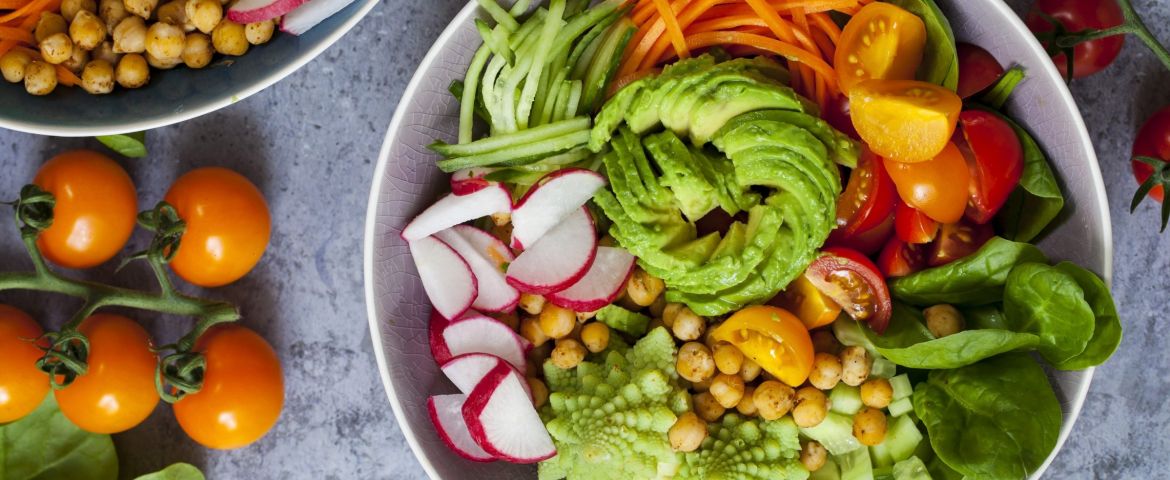Converting your meals to vegan and cutting out animal products can have major health benefits. Studies show a vegan diet can help lower your risk of heart disease and obesity. Eating vegan also leads to an increase in getting more nutritious whole foods into your diet.
What does it mean to “go vegan?”
Eating vegan means your diet excludes all animal-based or animal-derived ingredients. So — no meat, poultry, seafood, eggs, dairy, honey (produced by bees), or any candy or marshmallows that contain gelatin. Truly dedicated vegans also don’t buy products that have been made with or tested on animals — from cosmetics to wool, fur or leather clothing and accessories. If this sounds too restrictive, you may want to consider a vegetarian or plant-based diet only. A plant-based diet means the majority of your food comes from plants. Some who follow this diet do allow an occasional poultry or seafood entrée, such as eggs or salmon.
Still on the fence about if it’s something you want to try? Nutrition experts recommend to start by identifying the animal-based foods you eat every day, or almost every day, and determine if you would be ok with some simple swaps. For example, if you eat eggs regularly for breakfast — would you be ok with a plant-based egg alternative instead? Do you love a cheeseburger for dinner? Would you be willing to substitute a veggie patty for beef or turkey? If yes, then read on.
Myth: Vegans don’t get any calcium after giving up dairy.
Fact: Actually, there are many plant-based ways to get calcium into your diet. Did you know broccoli, kale and cooked collard greens are all high in calcium? So are almonds, chia seeds and black-eyed peas. There are also plant-based milk alternatives that, yes, include calcium just like cow’s milk.
Myth: Vegans don’t get enough protein, so they always feel hungry.
Fact: Not true. Plenty of protein is possible with a plant-based diet. For example: a cup of lentils has 16 grams of protein. Add some quinoa and your favorite nuts, and you’re over 20 grams total. Other high protein plant-based foods include spinach, beans, tofu and nut butters.
There are many high protein vegan recipes out there — and plenty of snack options, too. Can you say hummus? Dietitians recommend calculating how much protein you need based on if you are a man or a woman. The DRI (Dietary Reference Intake) is 0.36 grams of protein per pound (0.8 grams per kg) of body weight. This ends up being about 56 grams per day for the average sedentary man and 46 grams per day for the average sedentary woman. This may be enough to prevent deficiency, but the amount you need depends on many factors, including your activity level, age, muscle mass, fitness goals and overall health.
Myth: Vegans don’t get all of the vitamins and nutrients you need in your diet.
Fact: This is not completely true, and there are ways to supplement what you’re missing when you go plant-based. Nutrition experts say it’s definitely important to still get all of your nutrient needs met — and there are easy ways to do that:
- Vitamin B12: Found in meat, fish and eggs. If you give these up, you can easily take a 250mcg B12 supplement each day and try a fortified nutritional yeast.
- Iodine: Since iodine normally comes from animal-based foods, you’ll simply want to make sure you’re eating iodized salt or sea salt to flavor your foods.
- Omega-3s: if you’re still eating salmon or fish a few times a week, drinking hemp milk or enjoying avocadoes, chia seeds, tofu, beans and brussels sprouts — you’re good to go. But if you decide to eat 100% plant-based, dietitians recommend an omega-3 supplement since it will give you the anti-inflammation and brain benefits omega-3 food sources provide.
Ready to tap into the power of plant-based? Try these easy recipes for beginners. If you’re not ready to give up meat, eggs and cheese — that’s ok. You can still make small, easy and healthy changes by sticking to leaner meats and fish.
And be sure to boost the number of fruit and veggies you eat on the side to the recommended five servings a day by eating the rainbow of options. This is easier than ever in the spring and summer months when Michigan Farmers Markets have so many fresh, seasonal options.
Enjoy the many health benefits of getting more plants and less animal products into your diet.


